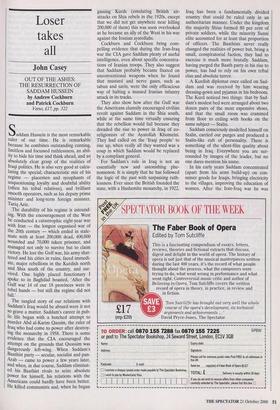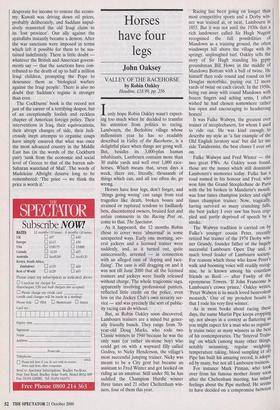Loser takes all
John Casey
OUT OF THE ASHES: THE RESURRECTION OF SADDAM HUSSEIN by Andrew Cockburn and Patrick Cockburn
Verso, £17, pp. 322
Saddam Hussein is the most remarkable ruler of our time. He is remarkable because he combines outstanding cunning, limitless and focussed ruthlessness, an abil- ity to bide his time and think ahead, and an absolutely clear grasp of the realities of Iraqi politics. He is also very good at calcu- lating the special, characteristic mix of his regime — placemen and sycophants of unquestioning loyalty and doubtful ability (often his tribal relatives), and brilliant smooth operators, such as his deputy prime minister and long-term foreign minister, Tariq Aziz.
The durability of his regime is astound- ing. With the encouragement of the West he conducted a catastrophic eight-year war with Iran — the longest organised war of the 20th century — which ended in stale- mate with at least 200,000 dead, 400,000 wounded and 70,000 taken prisoner, and managed not only to survive but to claim victory. He lost the Gulf war, his army shat- tered and his cities in ruins, faced immedi- ate, major rebellions in the Kurdish north and Shia south of the country, and sur- vived. One highly placed functionary I spoke to in Baghdad boasted, 'After the Gulf war 14 of our 18 provinces were in rebel hands — but still the regime did not fall.'
The tangled story of our relations with Saddam's Iraq would be absurd were it not so grave a matter. Saddam's career in pub- lic life began with a botched attempt to murder Abd al-Karim Qassim, the ruler of Iraq who had come to power after destroy- ing the monarchy in 1958. There is some evidence that the CIA encouraged the attempt on the grounds that Quassim was dangerously left-wing. When Saddam's Baathist party — secular, socialist and pan- Arab — came to power a few years later, and when, in due course, Saddam eliminat- ed his Baathist rivals to seize absolute power for himself, his relations with the Americans could hardly have been better. He killed communists and, when he began gassing Kurds (emulating British air- attacks on Shia rebels in the 1920s, except that we did not get anywhere near killing 200,000 of them) this was soon overlooked as he became an ally of the West in his war against the Iranian ayatollahs.
Cockburn and Cockburn bring com- pelling evidence that during the Iran-Iraq war the CIA gave Saddam plenty of useful intelligence, even about specific concentra- tions of Iranian troops. They also suggest that Saddam probably became fixated on unconventional weapons when he found that mustard and nerve gases, such as tabun and sarin, were the only efficacious way of halting a massed Iranian infantry attack in its tracks.
They also show how after the Gulf war the Americans clumsily encouraged civilian revolt against Saddam in the Shia south, while at the same time virtually ensuring that the rebellion would fail because they dreaded the rise to power in Iraq of co- religionists of the Ayatollah Khomeini. They had called on the 'Iraqi people' to rise up, when really all they wanted was a coup in which Saddam would be replaced by a compliant general.
For Saddam's rule in Iraq is not an essentially new and astonishing phe- nomenon. It is simply that he has followed the logic of the past with surpassing ruth- lessness. Ever since the British founded the state, with a Hashemite monarchy, in 1922, Iraq has been a fundamentally divided country that could be ruled only in an authoritarian manner. Under the kingdom the majority Shias formed 80 per cent of private soldiers, while the minority Sunni elite accounted for at least that proportion of officers. The Baathists never really changed the realities of power but, being a small, conspiratorial faction, they had to exercise it much more brutally. Saddam, having purged the Baath party in his rise to power, has had to rely on his own tribal clan and absolute terror.
A Kurdish diplomat once called on Sad- dam and was received by him wearing dressing-gown and pyjamas in his bedroom. The Kurd noticed two things: that by Sad- dam's modest bed were arranged about two dozen pairs of the most expensive shoes, and that the small room was crammed from floor to ceiling with books on the same subject — Stalin.
Saddam consciously modelled himself on Stalin, carried out purges and produced a Stalin-like cult of personality. There is something of the silent-film quality about being in Iraq. Everywhere you are sur- rounded by images of the leader, but no one dares mention his name.
In his early years Saddam concentrated (apart from his arms build-up) on con- sumer goods for Iraqis, bringing electricity to the villages, improving the education of women. After the Iran-Iraq war he was desperate for income to restore the econo- my. Kuwait was driving down oil prices, probably deliberately, and Saddam impul- sively reasserted the old Iraqi claim to its 'lost province'. Our ally against the ayatollahs instantly became a demon. After the war sanctions were imposed in terms which left it possible for them to be sus- tained indefinitely. There is little doubt whatever the British and American govern- ments say — that the sanctions have con- tributed to the death of up to half a million Iraqi children, prompting the Pope to denounce them as 'biological warfare against the Iraqi people'. There is also no doubt that Saddam's regime is stronger than ever.
The Cockburns' book is the record not just of the career of a terrifying despot, but of an exceptionally foolish and reckless chapter of American foreign policy. Their interventions in Iraq, their equivocations, their abrupt changes of side, their ludi- crously inept attempts to organise coups have simply ensured that what was once the most advanced country in the Middle East has (in the words of the Cockburn pair) 'sunk from the economic and social level of Greece to that of the barren sub- Saharan wasteland of Mali'. The words of Madeleine Albright deserve long to be remembered: 'The price — we think the price is worth it.'


























































































 Previous page
Previous page